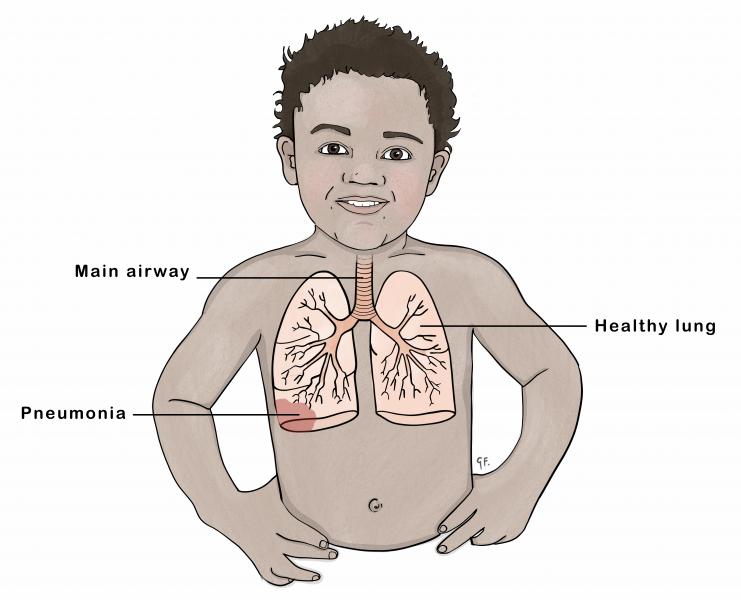

Immunisation helps to prevent some serious causes of pneumonia.
Pneumonia is an infection of the lungs. It often affects only part of the lungs.
The illustration shows pneumonia affecting part of one lung.

A smoke-free environment lowers the chance of your child getting pneumonia.
Viruses and bacteria can both cause pneumonia.
In tamariki, especially young tamariki, viral pneumonia is more common.
It can be difficult to tell whether the pneumonia is due to a virus or bacteria.
Yes, you can catch the viruses that cause viral pneumonia - they can spread easily between people. Most tamariki with a virus just get a cold. Only a few will get pneumonia. Viral infections, including viral pneumonia, are more common in winter.
Bacterial pneumonia does not usually spread between people.
Because it's difficult to tell whether pneumonia is viral or bacterial, it is wise to keep your child with pneumonia away from others.
Anyone can get pneumonia, but some tamariki are more likely to than others. Tamariki are at greater risk of getting pneumonia if they:
Pneumonia causes cough, fever and difficulty breathing.
Breathing difficulties can include:
Check the signs that show your child is struggling to breathe [1]
Viral pneumonia usually develops over days. It starts with a cold and a runny nose. Then there is a cough, and sometimes fever, before breathing problems develop.
Bacterial pneumonia usually develops faster, over a day. It causes high fever, a cough, and breathing problems. Your child may be very tired and look quite unwell.
Sometimes bacterial pneumonia develops during a viral infection. If this happens, your child will usually have a cold for a few days, and then become more unwell quite quickly.
If you are worried that your child may have pneumonia, you need to see a doctor.
You should see a doctor urgently if your child:
Dial 111 within New Zealand (use the appropriate emergency number in other countries) and ask for urgent medical help if your child:
Your family doctor can usually diagnose pneumonia after looking at your child and listening to their chest. Sometimes, they may arrange a chest x-ray which will usually show the pneumonia.
If your child looks very unwell, and especially if they're very young, your doctor may ask you to take them to hospital.
Your doctor will give antibiotics to your child if they have bacterial pneumonia. Doctors may use antibiotics when it is not clear whether your child's pneumonia is viral or bacterial. If your child is young or sick enough to be in hospital, they will often have antibiotics by a drip (into a vein).
They may also need support with their breathing and feeding. A small number of children may become extremely unwell.
If your child is miserable because of pain or fever, you can give paracetamol to make them more comfortable. You must follow the dosage instructions on the bottle. It is dangerous to give more than the recommended dose.
Your child will need rest to help them recover from pneumonia. Encourage them to drink fluids and eat healthy small meals.
If your doctor has given your child antibiotics, make sure they take all the doses until finished.
It is wise to keep your child with pneumonia away from other children, to limit the spread of infection.
If your child is still coughing after 4 weeks, go back to your doctor.
A child usually takes a couple of weeks to fully recover. Coughing up phlegm may be part of the recovery process. The cough may last up to 4 weeks but should gradually be getting better over this time.
Take your child back to your doctor if:
A long-lasting cough, coughing up phlegm, or repeated pneumonia can be a sign of bronchiectasis. This is a type of scarring in the lungs.
See KidsHealth's information on bronchiectasis [2].
Most children make a full recovery from pneumonia with no lasting effects.
A small number of children may need specialised treatment for complications. A very small number of children may get very sick.
Immunisation helps to prevent some serious causes of pneumonia, in particular, immunisation against the following diseases:
Breastfeeding your baby protects them from getting pneumonia by boosting their infection-fighting (immune) system. Breastfeeding beyond 4 months of age offers the best protection.
Make sure your child's environment is smoke-free. This will help reduce the chance of your child getting pneumonia. If you want to give up smoking:
Make sure your child keeps up with their treatment for any long-lasting (chronic) conditions such as asthma.
Keeping the house warm and well-insulated will also decrease your child's risk of developing pneumonia.
Read about keeping your home warm and dry [6]
Make sure everyone in your family washes their hands regularly and thoroughly, and dries them well including (but not only) before preparing food and eating.
Paediatric Society of New Zealand. 2005. Best practice evidence-based guideline: Wheeze and chest infection in infants under 1 year. NZ Paediatric Society of New Zealand [7].
Illustration by Dr Greta File. Property of KidsHealth.
This page last reviewed 29 May 2023.
Email us [9] your feedback
Links
[1] https://kidshealth.org.nz/signs-children-are-struggling-breathe?language=en
[2] https://kidshealth.org.nz/bronchiectasis?language=en
[3] https://kidshealth.org.nz/whooping-cough-immunisation?language=en
[4] https://kidshealth.org.nz/flu-immunisation?language=en
[5] https://quit.org.nz/
[6] https://kidshealth.org.nz/keeping-your-home-warm-dry?language=en
[7] https://www.paediatrics.org.nz/resources/child-health-guidelines/show/113
[8] https://kidshealth.org.nz/node/1661?language=en
[9] https://kidshealth.org.nz/contact?from=http%3A%2F%2Fkidshealth.org.nz%2Fprint%2F81%3Flanguage%3Den